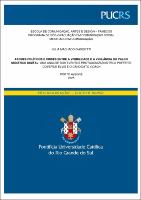| Share record |


|
Please use this identifier to cite or link to this item:
https://tede2.pucrs.br/tede2/handle/tede/11568| Document type: | Dissertação |
| Title: | Atores políticos e crises entre a visibilidade e a vigilância do palco midiático digital : uma análise dos eventos protagonizados pelo prefeito cover de Elvis e o candidato coach |
| Author: | Biasibetti, Julia Machado  |
| Advisor: | Oliveira, Rosângela Florczak de |
| Abstract (native): | Este estudo busca contribuir com a pesquisa acadêmica sobre riscos e crises no âmbito da comunicação política. O objetivo é refletir sobre como a dinâmica de visibilidade e vigilância que incide sobre os atores políticos no ambiente midiático digital se relaciona com as crises no contexto da democracia. Em busca de pistas acerca das possíveis respostas, analisamos a ligação telefônica entre o prefeito gaúcho Fabiano Feltrin e o ministro Paulo Pimenta e a cadeirada que o candidato a prefeito de São Paulo, Pablo Marçal, levou do seu concorrente, José Luiz Datena. A partir das lentes epistemológicas do Paradigma da Complexidade (Morin, 2011) e da Hermenêutica de Profundidade (Thompson, 1995), articuladas com a Pragmática da Comunicação (Watzlawick; Beavin; Jackson, 1985) e conceitos centrais como o da incomunicação (Wolton, 2023), o percurso teórico envolve reflexões sobre as metamorfoses sociais, políticas e tecnológicas (Beck, 2018) que transformam as perspectivas comunicacionais na esfera pública (Habermas, 2023); crises e escândalos políticos decorrentes da visibilidade e da vigilância midiática (Thompson, 2002) no contexto da democracia (Castells, 2018); atores políticos e suas representações políticas (Hobbes, 2003; Pitkin, 2006) e teatrais (Balandier, 1982; Goffman, 1985) e possíveis dimensões de cuidado (Tronto, 2007; Brugère, 2023). Como resultados, evidenciamos que as perspectivas de visibilidade e vigilância incidentes sobre os atores políticos no palco midiático digital — somadas ao efeito bumerangue (Morin, 2011) inerente a essa atuação, que gera e alimenta rupturas de representação (Goffman, 1985), escândalos e polêmicas (Thompson, 2002; Ekström; Johansson, 2008; Cabás, 2011) — constituem uma relação de recursividade (Morin, 2011), na qual tudo é causa e efeito, dentro de um circuito de retroalimentação (Watzlawick; Beavin; Jackson, 1985), que amplia não apenas o descrédito na atuação política, mas também corrói a confiança na própria democracia (Castells, 2018) |
| Abstract (english): | This study aims to contribute to academic research on risks and crises within the realm of political communication. The objective is to reflect on how the dynamics of visibility and surveillance affecting political actors in the digital media environment relate to crises within the context of democracy. In search of clues to possible answers, we analyzed the phone call between the mayor of the Brazilian city of Farroupilha, Fabiano Feltrin, and Minister Paulo Pimenta, as well as the chair-throwing incident involving the candidate for mayor of São Paulo, Pablo Marçal, and his opponent, José Luiz Datena. From the epistemological perspective of the Paradigm of Complexity (Morin, 2011) and Depth Hermeneutics (Thompson, 1995), combined with the Pragmatics of Communication (Watzlawick, Beavin & Jackson, 1985) and central concepts such as incommunication (Wolton, 2023), the theoretical framework explores reflections on the social, political, and technological metamorphoses (Beck, 2018) that reshape communicational perspectives within the public sphere (Habermas, 2023); political crises and scandals arising from media-driven visibility and surveillance (Thompson, 2002) in the context of democracy (Castells, 2018); political actors and their representations in both political (Hobbes, 2003; Pitkin, 2006) and theatrical terms (Balandier, 1982; Goffman, 1985); and possible dimensions of care (Tronto, 2007; Brugère, 2023). As results, we highlight that the dynamics of visibility and surveillance affecting political actors on the digital media stage—combined with the boomerang effect (Morin, 2011) inherent in this performance, which generates and fuels ruptures of representation (Goffman, 1985), scandals, and controversies (Thompson, 2002; Ekström & Johansson, 2008; Cabás, 2011)—constitute a recursive relationship (Morin, 2011) where everything is both cause and effect, within a feedback loop (Watzlawick, Beavin; Jackson, 1985). This loop not only deepens the discrediting of political actions but also erodes trust in democracy itself (Castells, 2018). |
| Keywords: | Democracia Comunicação Política Riscos e Crises Atores Políticos Ambiente Midiático Digital Democracy Political Communication Risks and Crises Political Actors Digital Media Environment |
| CNPQ Knowledge Areas: | CIENCIAS SOCIAIS APLICADAS:COMUNICACAO |
| Language: | por |
| Country: | Brasil |
| Publisher: | Pontifícia Universidade Católica do Rio Grande do Sul |
| Institution Acronym: | PUCRS |
| Department: | Escola de Comunicação, Arte e Design |
| Program: | Programa de Pós-Graduação em Comunicação Social |
| Access type: | Acesso Aberto |
| Fulltext access restriction: | Trabalho não apresenta restrição para publicação |
| URI: | https://tede2.pucrs.br/tede2/handle/tede/11568 |
| Issue Date: | 27-Feb-2025 |
| Appears in Collections: | Programa de Pós-Graduação em Comunicação Social |
Files in This Item:
| File | Description | Size | Format | |
|---|---|---|---|---|
| Dissertação Julia MachadoBiasibetti_PPGCOM.pdf | JULIA_MACHADO_BIASIBETTI_DIS | 4.9 MB | Adobe PDF |  Download/Open Preview |
Items in DSpace are protected by copyright, with all rights reserved, unless otherwise indicated.




